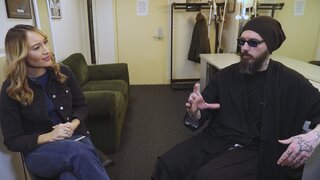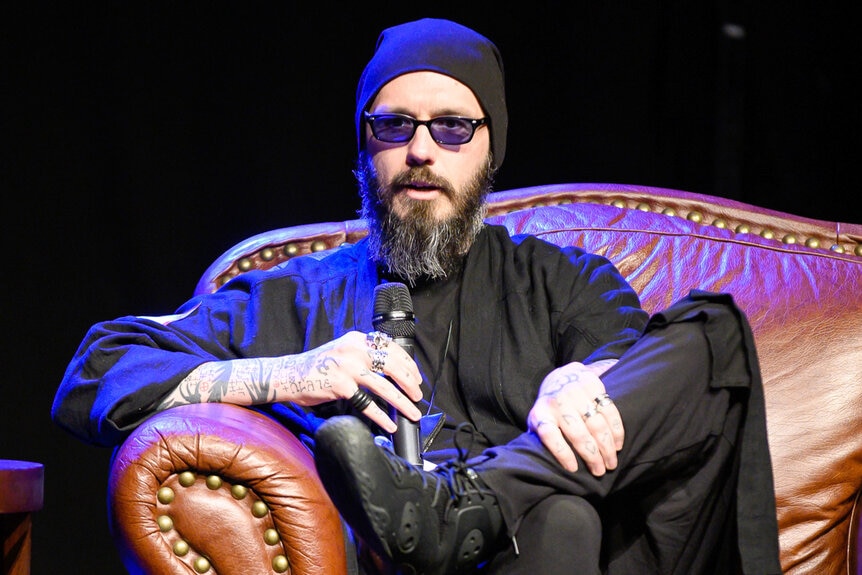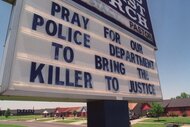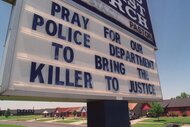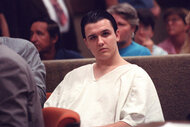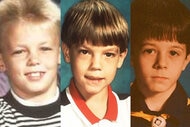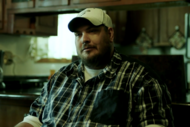Create a free profile to get unlimited access to exclusive videos, breaking news, sweepstakes, and more!
Damien Echols Survived 18 Years On Death Row With The Help Of Magick
Damien Echols was sentenced to death in 1994 for the infamous West Memphis murders of three young boys, but was freed in 2011.
Imagine this: You're locked away in a tiny bare cell, far away from your friends, your family, your home. You're deprived of sunlight to the point where you never know what time it is; you barely interact with other other humans; you're constantly in some kind of physical pain. Every day brings you that much closer to your death sentence, one that's been handed down for a crime you know you didn't commit.
That existence was Damien Echols' reality on death row for 18 years. And somehow, he survived the experience and came out stronger and more fulfilled than ever — and he credits it all to what he calls "high magick."
Echols was originally sentenced to death in 1994 as part of the infamous West Memphis Three case. Three 8-year-old boys — Christopher Byers, Steve Branch, and Michael Moore — were murdered, their bodies found hogtied, naked, and and abandoned in a West Memphis, Arkansas creek in May 1993.
Echols, then 18, was soon charged with the crime, with police insisting it was a satanic ritual murder. His close friend, 16-year-old Jason Baldwin, and a 17-year-old acquaintance, Jessie Misskelley, were charged as well. On the basis of Misskelley's confession (which he later claimed was coerced) and not much else, the three were found guilty of murder. Misskelley and Baldwin were sentenced to life in prison, Echols was sent to death row.
Of course, their story had a somewhat happy ending: All three were released in 2011 after the discovery of new forensic evidence; while they were not exonerated, they entered Alford pleas, which means they maintained their innocence but acknowledged there was enough evidence against them to convict. But while Echols survived death row long enough to walk out a free man, it wasn't, as he admitted during a talk Thursday at the NYC true crime festival Death Becomes Us, an easy task.
As Echols described it, life on death row consists of one 8-by-10 room, 24/7. For the first 10 years he had access to other people, he claimed, but as the years went by, the inmates were separated more and more until he ended up in his solitary cell, which had just one window. Barely any light came through, as there was a brick wall just a few feet in front of it. "You have to make time," he explained of the endless, lonely, indistinguishable hours in the cell.
"People go stark raving insane in there all the time," Echols said. He told tragic stories stories of fellow inmates, like a man who cut his throat with a shaving razor and curled up in a blanket so it would hide the blood and allow him enough time to die before the guards noticed, and of someone who broke his fists pounding on his cell, screaming the devil was in there, only to get out, have his hands bandaged, and be thrown back in.
And it wasn't just the bad food, the omnipresent specter of death, and the solitary confinement that made death row so hellish. Echols recalled vicious guard beatings that left him "pissing blood."
"[The guards] will take your books, your letters.... I was beaten [because] of the new evidentiary hearing, less than an hour after the announcement, they destroyed and took everything in my cell because I was going back to court."
But Echols said he was able to make it through all these hardships because he started practicing magick, which made conditions bearable and kept him sane.
Comedian Dave Hill, who interviewed Echols Thursday, joked a bit about magick, knowing many aren't super-familiar with the topic.
"Magic is for nerds," Hill said. "But magick with a 'k' sounds like there are goats involved."
But ... what is it?
Magick, as Echols puts it, "is the western path to enlightenment." It's similar to things like the Law of Attraction or The Secret, in that it all has to do with manifesting in some way, according to Echols.
"[We're] wandering aimlessly, that's what we do through life. We don't remember where we come from, where we're going, or why we're supposed to be going there. Magick causes you to remember some of these things and gives you a sense of purpose," he explained.
Practicing magick for Echols consists of a variety of different meditation, visualization and breathing techniques, as well as ceremonies and rituals, all for the purpose of spiritual growth. This kept him balanced and helped him manage the physical and emotional stress and pain of imprisonment.
Echols was able to learn so much about magick through all his time reading in prison. He got his hands on whatever he could find to read during those endless days, and started from there.
Echols would look in the indexes of books he enjoyed to find other titles; then, when people wrote to him asking if he wanted them to send him books, he could suggest exactly what titles he wanted. A true passion was born.
In fact, Echols is still committed to magick to this day. After all, it wasn't easy adjusting to life after prison.
"I didn't realize I had lost things like facial recognition ability, voice recognition ability, destroyed my eyesight. It takes a very heavy toll on you mentally, physically, emotionally," he explained. He even claimed that he had barely any memories of his first two years out of prison, as he was just so traumatized.
But through his commitment to magick, Echols has more than just perservered. He currently lives in New York City with his wife, Lorri Davis, who he met when she wrote to him while he was in prison. He's written three books, including one that describes the magick practices that got him through those 18 years: "High Magick: A Guide to the Spiritual Practices That Saved My Life On Death Row." He's running a retreat in Joshua Tree later this year. And he continues to spread the message of magick however he can.
As Echols put it, magick got him through not just a "physical prison" but also a "mental prison." And if he had to back and do it all over again, he would: "I am thankful for what I went through."
To attend other panels this weekend, including the Martinis & Murder Live show, visit Death Becomes Us.
